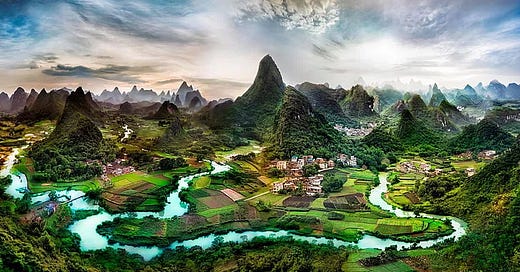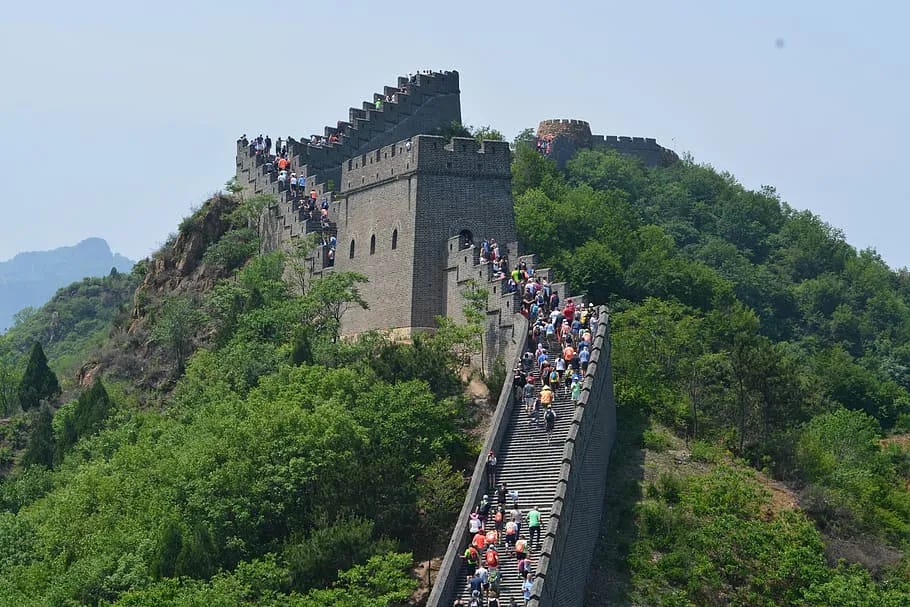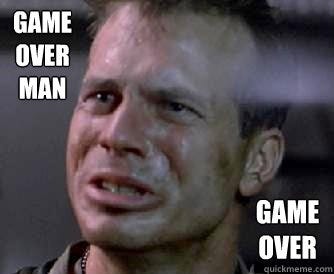"Illusion is the dust the devil throws in the eyes of the foolish." -Minna Antrim
I have been discussing a superset of the information in this article series with various parties for many years now—including some very interesting conversations with people in government, corporate, royalty, and finance positions that I will not cite out of courtesy or relative necessity, but whose information on the topic gradually sculpted mine. My own explorations into this topic began while I was running one of Wall Street's larger buy-side Asian bond/derivatives accounts, and continued during my work in education when I explored the job of architecting a program intended for mathematically precocious youth in China. Since James Corbett published the following article, I thought it was time that I chimed in.
Note that per content, I have strong agreement with Corbett, but I see the Big Picture under a slightly different lens, and that's the thrust of my own article series.
I fully expect that there will be disagreements among readers with the content, though I'm intentionally keeping it as plain as I can for the purposes of broaching the discussion. After all, this is first and foremost a discussion about the challenging task of epistemology in a world in which powerful actors have an interest in erecting significant asymmetric barriers that guide discernment of reality. I am under no illusion that I'm writing from a place of perfect knowledge or even conclusive proof (of much of anything). But whether I understand the larger pool of information, I have little doubt that most of the citizens of the Western world and also likely China are being sold false images. I'm curious to see what readers think, too.
What is China?
"We have made the Reich by propaganda." -Joseph Paul Goebbels
The question sounds so innocent, but we in the West are beset with media that paints numerous curiously diverging pictures of China and what it means for the West. Is China one or more of the following?
The Glorious Communist China blossoming from Eastern philosophies in which all people flow together line grain in the wind,
The post-Soviet Evil Empire bent on taking over the world,
A nation that evolved into its own form of capitalist state within a one party system that barely resembles anything you might associate with a communist utopia,
A collection of elites who pull in their own directions within rivalrous confines,
The world's technological juggernaut destined to take over the world,
Something else?
These and other possibilities are not mutually exclusive, of course.
Is this a Choose Your Own Adventure tale, or some sort of Matrixian Metaverse?
I fully recognize that even approaching this topic from a neutral standpoint requires that most people hold back a massive buildup of cognitive dissonance. I'll do what I can to work at unwinding that, myself. I've been through it on many topics. The very notion that the entire world has been fooled for several decades or centuries or reboots of the Matrix is a tough pill to swallow.
Let's start simple: China built the wall.
The Great Walls of China
"Even paradise could become a prison if one had enough time to take notice of the walls." -Morgan Rhodes
The first Great Wall of China was the series of barriers built over multiple centuries and dynasties. Good fences make good neighbors, and according to experts, the wall stifled Mongolian invasions or something something ancient aliens. It is also noteworthy that walls do a great job of keeping people inside the gates.
A few short centuries later came the Great Firewall of China. It was hard enough for Westerners and Chinese to cross a language barrier, much less follow the precise degree of Clown World evolution taking place on each other's side of the fence.
Is this how shame based societies invent new genres of porn? Never mind. Don't answer that.
Okay, look, here's what I'm getting at: the Western world scarcely understood what hit them when the WHO declared a pandemic. How many people had to extricate themselves from television-messaging during the pandemic? Okay, when we see that much less about what's going on in China, doesn't that create the perfect environment in which to run a large laboratory for technocratic control with a tinge of Hollywood production?
Does this really look like the kind of brutal dictator who has centralized power of the largest human population in all of history?
Or something more like a Disney character? The son of a man tortured with his wife in the audience before being exiled by the CCP? There's something fishy about all of this, don't you think?
Is it at all possible that Xi was chosen (by whom?) after being born into fear of power, and was guided up the ladder by powerful forces?
We don't know shit about China.
At least, the average person should start from that position and begin putting the pieces together, under an appropriately cynical framework. I maybe know just a little, but I know a heck of a lot more about the Clown World that is Western powers. Enough to ask questions.
Let's start with, "How do we really know what's on the other side of the Great Walls of China?"
What the Media Tells Us
"No matter how cynical you become, it's never enough to keep up." -Lily Tomlin
China barely publishes reliable economic data. Want to earn your doctorate in Economics studying China? You may have to first design a system of trustworthy data collection in a nation whose bureaucracy is thoughtfully enormous to the point that the most informative way to view aggregates published by the government is to point at them and say, "That's one of infinitely many charts and graphs that I now know not to be true."
So, who could even possibly get a reliable grip on the situation?
Note the date, the source, and the opening line. Oh, and the location of the photo, which was inserted into the online article a few years after its initial publication. Hong Kong was not even part of China in 1993. That is to say that the editors could not even paint a picture of the modern marvel of China at that time without reaching outside of China.
What is Foreign Affairs, anyhow?
Since I'm the sort of nerd who has been reading from Foreign Affairs (FA) since my days in high school policy debate in the early 1990s, I can share a perspective. FA is the American magazine published by the Council on Foreign Relations (CFR), which is a nonprofit think tank whose name you can sparsely mention in public without somebody tapping you on the shoulder, declaring a violation of the conspiracy theory statute.
While CFR has been overshadowed in cocktail-party chatter by the strangely obvious cut out that is the World Economic Forum, the CFR is more on the level of aggregates of top-shelf power-pushers such as the Trilateral Commission or the Bilderberg Group (source of graph below).
It is noteworthy that the Board Members of the CFR are listed under "Funding and Controversies" on Wikipedia's startlingly sparse entry (somebody there wasn't doing their usual detail-oriented job of organizing the propaganda, ahem). These board members include many of the nation's top rotating political officers, such as Secretaries of HHS, Defense, the Treasury, and whatever else seems important. Those are people down the list. In the middle, if not the end. You'll also find the Chairman and CEO of Blackrock, other finance titans, and media giants new and old.
Of course, following the newly pushed narrative of the CFR, the Clintons fought to normalize relations with China, both as U.S. and international policy. This set the stage for rapid transfers of technology to China, often via multinational corporations who could take control over the means of production. The result was a crippling of the financial and thus political position of the American worker and anyone who felt that rule of law was the responsibility of nations, not corporations.
Remember that the "mainstream" media doesn't invent propaganda. They're just paid servants. Their job is to creatively propagate the messages. And since nobody in the world outside of newsroom executives, Washington Mandarins, and around seventeen other people including me sometimes read FA, almost nobody sees the root of the narrative.
And the narrative is evolving quickly from, "the Chinese (who were so recently the world's primary source of infectious disease) are now so amazing that they're stealthy mask ninjas who move like blades of grain as one with the wind to dodge COVID-19 [don't look behind the curtain]," to "China, whose major military developments of the recent past were largely for show, now suddenly builds the world's most advanced weapons."


Let's nobody talk about the fact that all the technology involved was developed in the West and somehow transferred to China (Edit: from an aeronautics professor told me that even the wind tunnel was given an award from the U.S.: the American Institute of Aeronautics and Astronautics awards the Chinese Academy of Sciences 2016 Ground Testing Award). Note the lack of details before this mic-drop tweet by a blue checkmark former CIA journeyman who now writes for major news outlets. That kind of lack of nuance and context is exactly why social media can suck.
Now, let's take a look at the fairly recent and sudden push of the new narrative of the dominant China that have emerged over the past few years (after nobody in the Western corporations or governments imagined that shifting so much production to China might result in some problems):
Jan 18, 2018 - Western companies bow to Chinese bullying, censor mentions of Taiwan, Tibet on websites.
Aug 2, 2018 - So much for 'Don't be Evil' as Google bows to China censorship.
Oct 9, 2019 - Corporate apologies to China.
Oct 10, 2019 - Hollywood's cave to China on censorship; This comes on the heels of greater public discussion of Hollywood's CIA ties. Don't worry, The Atlantic has cocktail-party talking point ready for you.
Dec 9, 2019 - The NBA Bows to China.
Much as we might blame basic greed over future profits for these public relations moves, it doesn't explain the story of the World Health Organization (WHO) bowing to China. China's tithing to the NGO is a tiny proportion of its budget, and it was the Gates Foundation's influence that radically changed the WHO's outward appearance.
Next (Current Events) Questions: How real is the response to the recent COVID-19 outbreak in Shenzhen? And what does it tell us about the current state of media control?

So, choose your own adventure in the Matrixian Metaverse? How about a "sexy cyborg" who casually walks the streets of Shenzhen in stripperwear, and handcrafts her own corset that makes those melons glow? What else is she selling aside from transhumanism?


I'm not saying she's wrong about everything I read from her while writing this article. What I'm saying is that she appears to be a bumper in a giant game of Hegelian pinball at a moment when my presumption would be to assume,
Her Shenzhen shenanigans wouldn't often escape the Great Firewall of China, and
She would be sitting in a Chinese prison (or worse).
By all means, add your own points of incredulity. Now extrapolate. Be careful, but extrapolate.
The Facade Hypothesis
"There's a level of admiration I actually have for China. Because their basic dictatorship is actually allowing them to turn their economy around on a dime…" -Justin Trudeau
Professor of political science, Michael Beckley moved to China to learn about the nation he felt was growing into the world's next superpower. He came away with the opinion that the Chinese Juggernaut story simply did not hold water.
I really believed the hype that China was going to be the dominant superpower in the world. And so I thought the key geopolitical test for my generation was going to be how can the United States and China create a peaceful transfer of power, essentially, from the United States to China. So, I moved to China for a couple of years to really immerse myself in the language and culture to understand this rising superpower. But then ironically by living there, I became aware of problems that China has…
The problems Beckley describes in this interview are extremely broad, and based in foundational technologies of culture and civilization. Beckley wrote a book summarizing his experience and information that he gathered while working at the Harvard Kennedy School's Belfer Center for Science and International Affairs, the Department of Defense, and the Rand Corporation.
Beckley's commentary extends beyond shoddy construction of apartment buildings. China was thrust into a modern state quite rapidly after more than a century of being repeatedly pulverized by the British-led West and then from within (perhaps at the behest of the corporate West?).


















